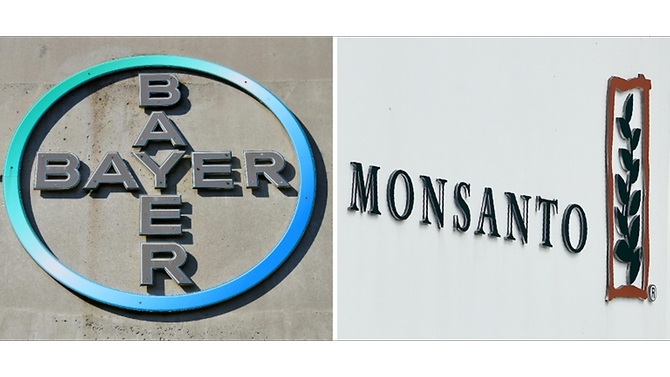Bayer raises US$7b in new capital to finance Monsanto deal
 |
| German pharmaceutical and chemical giant Bayer said it will raise up to €6 billion (US$7 billion) in fresh capital to help finance its takeover of US agrochemicals group Monsanto.. |
Bayer said in a statement it would issue 74.6 million new shares to existing shareholders at a price of €81 per share.
That is markedly cheaper than Bayer's current share price, which closed at €103.30 on the Frankfurt stock exchange on Friday.
Shareholders would be able to buy two new shares for every 23 shares currently held between Jun 6-19, the statement said.
"As a result, Bayer expects to generate gross proceeds of €6.0 billion from the capital increase," the German maker of Aspirin said.
It "intends to use the net proceeds from this transaction and the bond issues to repay amounts drawn under the syndicated loan facilities agreement for the acquisition of Monsanto."
The capital increase was "a significant component of the financing for the acquisition of Monsanto and the final equity measure associated with this undertaking," said chief executive Werner Baumann.
In addition, Bayer is planning to issue up to €20 billion in bonds denominated in both dollars and euros.
Originally announced in September 2016, Bayer are on the cusp of finalising the deal following conditional US government approval.
The deal was originally for US$66 billion, but subsequent divestment decisions mean it is now valued at around US$62.5 billion.
According to the US decision, the acquisition of Monsanto can happen as soon as planned divestments have been accomplished, Bayer said, adding this was likely within two months.
Bayer was previously told by competition authorities, including the European Commission, to sacrifice existing activities in seeds and pesticides worth €7.6 billion to homegrown rival BASF in exchange for approval of the Monsanto deal.
That means there will be less overlap and fewer savings when Bayer assumes the US firm's product range of genetically-modified seeds and compatible pesticides.
The EU Commission has said separately that it had approved BASF as a suitable buyer for the assets.
Environmentalists are unhappy with the deal, fearing that it will give too much power to the world's leading manufacturers of GMOs and the controversial weedkiller glyphosate.
When launching the bid, Bayer said it would not introduce genetically modified crops in Europe.
What the stars mean:
★ Poor ★ ★ Promising ★★★ Good ★★★★ Very good ★★★★★ Exceptional
 Tag:
Tag:
Related Contents
Latest News
More News
- Vietnam to lead trade growth in ASEAN (January 29, 2026 | 15:08)
- Carlsberg Vietnam delivers Lunar New Year support in central region (January 28, 2026 | 17:19)
- TikTok penalised $35,000 in Vietnam for consumer protection violations (January 28, 2026 | 17:15)
- Digital economy takes centre stage in Vietnam’s new growth model (January 28, 2026 | 11:43)
- EU Council president to visit Vietnam amid partnership upgrade (January 28, 2026 | 11:00)
- Vietnam entering a new growth phase in 2026 (January 28, 2026 | 10:02)
- VIMC targets higher profit and throughput in 2026 (January 26, 2026 | 19:00)
- GEVA a launchpad for Vietnam’s agricultural exports (January 26, 2026 | 12:03)
- Data-driven risk management signals major shift in customs administration (January 24, 2026 | 11:22)
- Cosmetics rules set for overhaul under draft decree (January 24, 2026 | 11:21)























 Mobile Version
Mobile Version